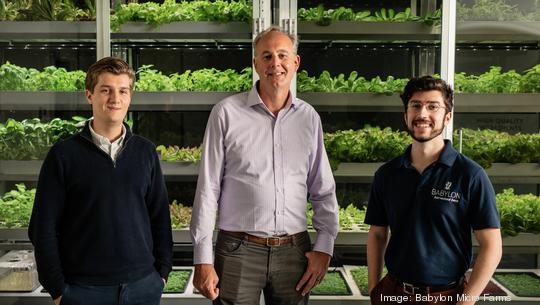
Room to grow is important for bok choy, red butter lettuce and for Babylon Micro-Farms, a startup that recently relocated its headquarters from Charlottesville to Richmond.
The company, which creates indoor hydroponic farming systems powered remotely by cloud technology, was co-founded in 2017 by University of Virginia classmates CEO Alexander Olesen and CTO Graham Smith.
As the Babylon team outgrew its Charlottesville space and began looking for a new location for its HQ, other states beckoned, eager to see a player in the vertical farming industry land on their soil.
“It’s an industry in demand, basically, as people see that this is a viable alternative for them to source their food more locally,” Olesen said.
But staying in Virginia, home to many of Babylon’s earliest supporters, including Lighthouse Labs, Startup Virginia and the Center for Innovative Technology, was the best path forward for the company, he said.
So, Babylon decided to plant its new roots in Richmond.
“It’s an exciting city, very close to where we were based previously,” said Olesen, who recently moved into his office in their new digs, a 7,700-square-foot space in Scott’s Addition.
The startup received a welcome just shy of being given the keys to the capital city. Governor Ralph Northam issued a news release announcing he was “thrilled” that Babylon Micro-Farms was investing $140,000 toward its expansion and relocation. Richmond’s mayor and other state elected officials added their own welcomes.
Along with the extra space, a defining reason for the move to Richmond was the ability to attract more talent, Olesen said, especially technology experts like back-end and front-end developers.
The company is planning to hire 24 people — slightly more than doubling its current workforce — as it aims to have 75 indoor farms installed by the end of the first quarter of 2021. Olesen said he wants to see hundreds of Babylon farms up and running by the end of the year.
Babylon’s clients are in senior living, education, healthcare and hospitality. With more room for research and development, it’s pursuing additional growth by making advancements that Olesen said will enable people to turn retail spaces into urban farms.
“We’ll be testing a lot of new crop varieties and a lot of new hardware to enable this industry to flourish,” he said.
The Covid-19 pandemic, which raised concerns about food insecurity, only increased interest in the company’s technology.
“I think the need for local and sustainable food systems has never been more apparent,” Olesen said.
Babylon’s support is coming from investors as well. This month, the company reported raising $2.75 million since late December 2020, according to SEC filings.